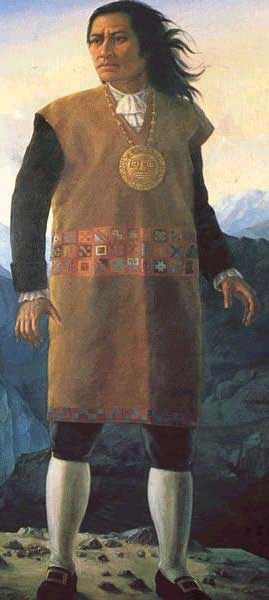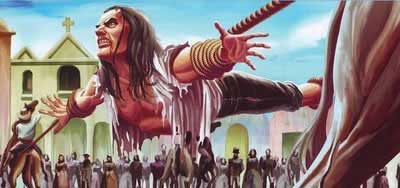Tupac Amaru II

In 1781 Tupac Amaru II (c. 1742-81), a Jesuit-educated mestizo who had changed his name to reflect his Aymara roots, leads thousands of indigenous rebels against the Spanish crown and lays siege to Cuzco. This mestizo chief, a direct descendant of the Inca emperors, headed the broadest of messianic revolutionary movements. The rebellion broke out in Tinta province, which had been almost depopulated by enforced service in the Cerro Rico mines. Mounted on his white horse, Tupac Amaru entered the plaza of Tungasuca and announced to the sound of drums and pututus that he had condemned the royal Corregidor Antonio Juan de Arriaga to the gallows and put an end to the Potosi mita. A few days later Tupac issued a decree liberating the slaves. He abolished all taxes and forced labor in all forms. The Indians rallied by the thousands to the forces of the "father of all the poor and all the wretched and helpless." He moved against Cuzco at the head of his guerilleros, promising them that all who died while under his orders in this war would return to life to enjoy the happiness and wealth the invaders had wrested from them. Victories and defeats followed; in the end, betrayed and captured by one of his own chiefs, Tupac was handed over in chains to the royalists. The Examiner Areche entered his cell to demand, in exchange for promises, the names of his rebel accomplices. Tupac Amaru replied scornfully, "There are no accomplices here but you and I. You, the oppressor and I, the liberator. Both of us deserve death!" Tupac was tortured, along with his wife, his children, and his chief aides, in Cuzco's Plaza del Wacaypata. His tongue was cut out; his arms and legs were tied to four horses with the intention of quartering him, but his body would not break; he was finally beheaded at the foot of the gallows. His head was sent to Tinta, one arm to Tungasuca and the other to Carabaya, one leg to Santa Rosa and the other to Livitaca. The torso was burned and the ashes thrown in the Rio Watanay. It was proposed that all his descendants be obliterated up to the fourth generation.
Tupac was tortured, along with his wife, his children, and his chief aides, in Cuzco's Plaza del Wacaypata. His tongue was cut out; his arms and legs were tied to four horses with the intention of quartering him, but his body would not break; he was finally beheaded at the foot of the gallows. His head was sent to Tinta, one arm to Tungasuca and the other to Carabaya, one leg to Santa Rosa and the other to Livitaca. The torso was burned and the ashes thrown in the Rio Watanay. It was proposed that all his descendants be obliterated up to the fourth generation.
Nearly two centuries had to pass after Tupac Amaru's death before the nationalist general Juan Velasco Alvarado would take up and apply Tupac's resounding, never forgotten words: "Campesino! Your poverty shall no longer feed the master!"
 Tupac was tortured, along with his wife, his children, and his chief aides, in Cuzco's Plaza del Wacaypata. His tongue was cut out; his arms and legs were tied to four horses with the intention of quartering him, but his body would not break; he was finally beheaded at the foot of the gallows. His head was sent to Tinta, one arm to Tungasuca and the other to Carabaya, one leg to Santa Rosa and the other to Livitaca. The torso was burned and the ashes thrown in the Rio Watanay. It was proposed that all his descendants be obliterated up to the fourth generation.
Tupac was tortured, along with his wife, his children, and his chief aides, in Cuzco's Plaza del Wacaypata. His tongue was cut out; his arms and legs were tied to four horses with the intention of quartering him, but his body would not break; he was finally beheaded at the foot of the gallows. His head was sent to Tinta, one arm to Tungasuca and the other to Carabaya, one leg to Santa Rosa and the other to Livitaca. The torso was burned and the ashes thrown in the Rio Watanay. It was proposed that all his descendants be obliterated up to the fourth generation.
